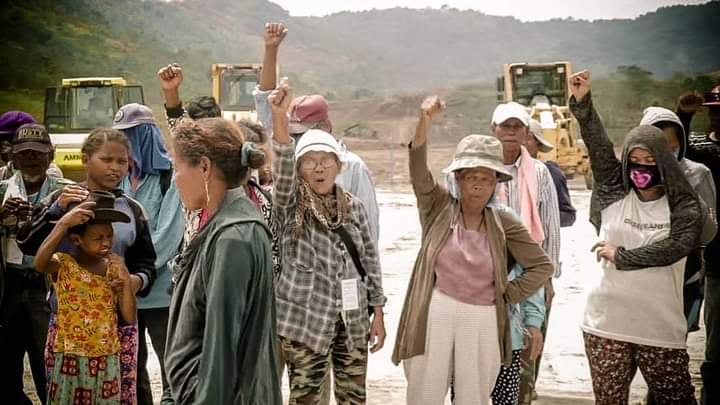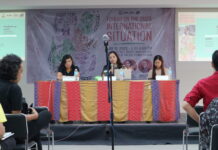
In photo: Aeta indigenous women opposing the construction of ADB-funded New Clark City project in the Philippines (Photo by Ding via Philippine Task Force for Indigenous Peoples’ Rights)
Despite the failures of the ADB’s policy assumptions as revealed by today’s crises, it continues on fundamentally consistent, flawed trajectory: of more debt, silence on structural issues, and a prioritisation of the private sector. Amid today’s pandemic and recession, it has been financing countries mainly through new loans.
IBON International is alarmed that the Asian Development Bank (ADB) continues on a debt-driven and neoliberal policy direction, as the Bank holds its Annual Governors’ Meeting this September 17– 18, 2020. Despite the failures of the Bank’s policy assumptions as revealed by today’s crises, it continues on fundamentally consistent, flawed trajectory: of more debt, silence on structural issues, and a prioritisation of the private sector.
The Bank is now holding its Annual Meeting with the theme of “Innovation, Inclusiveness, and Integration”. Amid today’s pandemic and recession, it has been financing countries mainly through new loans. In line with global discourse, it claims to be working for a “new normal” that is supposedly “green, resilient, and inclusive.”
We recall that the ADB, led by the United States and Japan, has been pivotal in influencing and promoting policies that have eroded previously won economic rights. The decades of privatisation of social services; the liberalisation, deregulation and de-nationalisation as “good business climates” for foreign capital; and its debt-driven programs with conditions, have exposed working peoples in the Asia Pacific to the effects of the recession, pandemic, and climate crisis.
We assert that the Bank’s current claim to “inclusiveness” is confronted by grim realities. Its prioritisation of loans despite the pandemic and recession mean more debt burdens for the Asia Pacific, which governments pass on to the shoulders of the people through more taxes. Of the May 2020 USD 20 billion ADB budget for pandemic “assistance”, around USD 17.5 billion are for loans, mostly on market rates, compared to around USD 79 million for grants and technical assistance. The 2019 disbursements were similarly driven by loans on market rates. The Bank has also been supporting debt-driven projects, such as the New Clark City in the Philippines, which, despite evidence of displacement of communities and ecological destruction, have been credited for being aligned with sustainable development.
The ADB claims to be for “social inclusion,” while being silent on the structural roots of worsening inequalities and unsustainable economies. Left unacknowledged are the roles of the market power of transnational corporations, supported by elite governments, in the dismal situation of socio-economic rights today. Its prioritisation of loans despite the pandemic and recession mean more debt burdens for the Asia Pacific, which governments pass on to the shoulders of the people through more taxes.
The ADB efforts to set the stage for “economic recovery” are also of concern. It continues to embark on its Strategy 2030 that is founded on corporate-driven development and “regional integration.” Following current development conversations about “Building Back Better,” the ADB now joins the chorus of other international finance institutions like the International Monetary Fund (IMF) and the World Bank.
The ADB claims to be for “social inclusion,” while being silent on the structural roots of worsening inequalities and unsustainable economies. Left unacknowledged are the roles of the market power of transnational corporations, supported by elite governments, in the dismal situation of socio-economic rights today—as seen in race-to-the-bottom wages, and the land grabbing of peasant and Indigenous lands. The Bank forwards a model of a “new normal” and “economic recovery”that presents a business opportunity. Its vision of “resetting Asia,”likethe “Great Reset” of the IMF, surrenders the ecological agenda and the “digitalisation” of economies to the power of big private sector.
IBON International believes that the ADB’s responses are far from the ambition necessary to address people’s needs amid crises today. They do not create conditions to the long-term need for development through systemic change. Appeals to “sustainable recovery” and “inclusion” would be a smokescreen for fundamentally business-as-usual if international policy shifts would not take place.
To ensure the primacy of people’s needs in these crucial times, working peoples must substantively shape and even lead national development processes that affect people’s rights and their communities. We enjoin people’s movements and organisations around the world in echoing calls, such as that of the People Over Profit network, to end the ADB’s support of corporations, to cancel debts, and to reject the ADB’s neoliberal agenda.
Instead of the driving influence of multilateral development banks (MDBs) in Asia Pacific countries, people and their organisations should be the primary actors in development. To ensure the primacy of people’s needs in these crucial times, working peoples must substantively shape and even lead national development processes that affect people’s rights and their communities—from health responses, economic assistance, to assessments of infrastructure needs to project implementation, to processes involving loan or grant agreements. They must also be influential in international development policy platforms where MDBs and the big private sector currently play a huge role.
We enjoin people’s movements and organisations around the world in echoing calls, such as that of the People Over Profit network, to end the ADB’s support of corporations, to cancel debts, and to reject the ADB’s neoliberal agenda. We assert that it is time for an ambitious overhaul that casts off the neoliberal dogma, and critiques the current functions and the justifications for the existence of MDBs such as the ADB.###


















